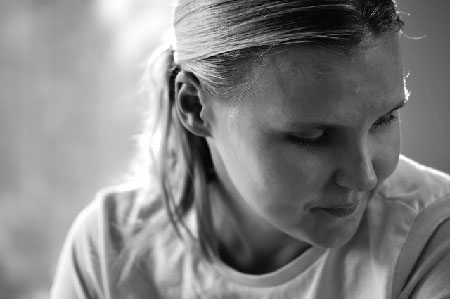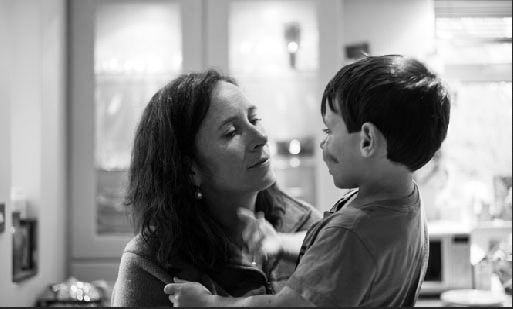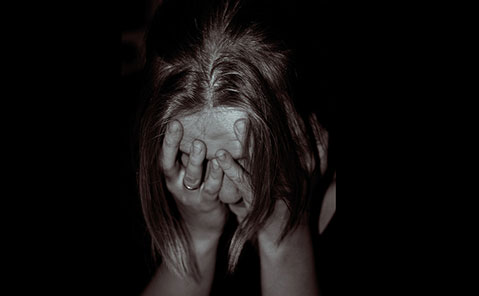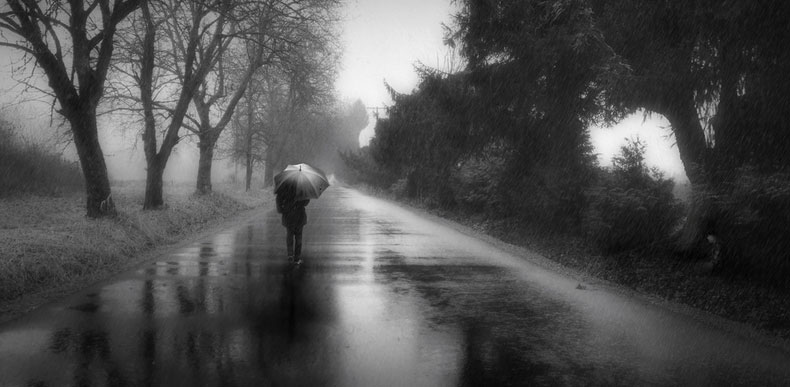"Kids these days! I blame the parents"
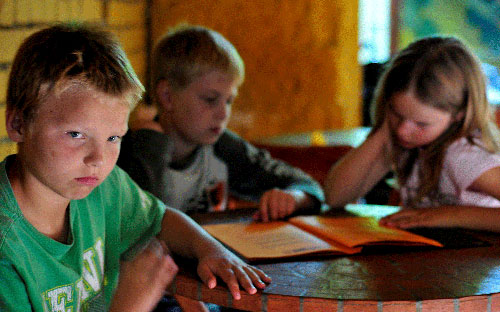
by Katy Elphinstone, July 2017
-
“Kids these days!” – they’re so passive, apathetic, and demotivated, aren’t they? They can’t pay attention. They don’t want to work, they just play on their smartphones all day. They have too much stuff – everything they want, they just get! It seems they don’t get punished or even pulled up on their cheek, or when they throw tantrums. They’re allowed to stay up playing computer games all night, then they refuse to go to school. How can their parents allow them to get away with it?
When we were their age… we had a job (or three)! We applied ourselves to our studies; we were curious and active. We helped in the house! We said ‘please’ and ‘thank you’.
What is going wrong with the new generation? And even more importantly: who’s to blame? The obvious culprits are the parents – and perhaps in particular we should turn our disapproving gaze towards those mothers.
-
Endurance
Today, when you become a parent, you may not immediately become aware of this, but you have just entered on the ultimate journey of self-sacrifice. Your endurance – both physical and psychological – will be tested to its outer limits. There will be extended periods of time when you won’t even know anymore what your own needs are, let alone have them met.
You will live through many moments – or long hours – during which your first thought will be ‘I must just keep on, I must! For my child. I can’t afford to collapse or fall apart now’ (and your body will be aching, your brain will be screaming, and you’ll grit your teeth and keep going anyway). If your child has any 'special needs', disabilities, learning difficulties or chronic illnesses, at times this agony will become so intense you’ll be lucky to manage to endure it every time: you may just reach breaking point.
The exhaustion will accumulate, and the emotional pressure can become greater than any person can reasonably endure without significant cost to themselves.
To any parents who have had psychological and emotional repercussions from this kind of living, I want to say to you: in such a situation, having ‘problems’ yourself; maybe becoming depressed, unstable, or alcoholic (or developing other conditions or addictions) is in my opinion simply the natural reaction of any human being who is forced to endure such extreme and persistent duress, more or less on their own.
-
Isolation
Perhaps it‘s logical to think that things have always been this way. Isn’t this the natural lot of parents?
I do not believe this is the case. George Mombiot, in his essay ‘There Is Such a Thing As Society’, begins ‘What do we call the age we're living in? ... To me it's obvious. This is the Age of Loneliness.'
The main problem is not in fact the natural demands of parenthood. It’s that all too often we’re doing all this in situations of extreme isolation. There is usually little sustained and familiar contact with other families (and in many cases there is minimal contact even within our own immediate families), or our community – and the contact there is, is usually not of the right kind.
Parents need continuous practical and psychological support from other people who love and care for them, without judging them or ordering them around. They need to trust and rely on others. Human evolution means we are specifically designed to provide and receive this kind of contact and mutual support, even though our current conditioning and social setup work directly against this principle.
So, imagine for a moment that you are the parent of a kid who is ‘different’; who’s not fitting in, and not managing in their daily lives. At home your child might be frequently subject to outbursts of frustration, rage, aggression and despair. They might need medication, or release their emotional pain through self-harm. There are probably times when you’re spending night after night sleeplessly, grappling through the dark hours with the shadowy monsters of your child’s fears, through endless struggles and last stands – all within the privacy of your own home (and hoping the neighbours don’t hear). And once your child is (finally) asleep, there you are, left with the company of no-one besides your own distraught, grey face in the bathroom mirror.Frankly, going crazy looks to me like a logical human reaction… to isolation, and a true lack of reciprocal love, support, and being ‘held’ by others. Especially in situations that have reached this extreme.
Drowning in stuff
In addition to this, the system we live in perpetuates (pretty aggressively sometimes) the notion that ‘you are what you have’.
Recently I saw a short documentary which talked about people in the developed world, our often soulless and isolated work on our computers shut up in our box-offices. Then it cuts to say ominously ‘but your real job…’ (and it shows adverts, retail… stuff you can buy) ‘is SHOPPING.’
I found this very chilling, as it instantly struck me that it was true. We have to feed the system, grow the economy, right? This is actually much more important than individuals (come on, don’t be selfish!).
I recently downloaded some activity sheets for my kids. Only when they were working at them later did I see the blurb from the web site I’d got them from. “Keeping Kids Busy’. Again I had that chilling sensation.
So children and adults alike, we are being ‘kept busy’, while our main job is consuming… shopping. To perpetuate a system where the rich get ever richer (and more unhappy too, there’s the absurdity!), and ordinary people strive and survive each day, each new disappointment and cutback, or lack of recognition or satisfaction in their jobs, while living in fear for their livelihoods, their futures, and their children’s futures. And all the while we continue to spend, spend, spend – as much as our means permit. I do it too. Sure the kids have got remote control cars, and the latest Lego models. Sure we have our Iphones… this is the world we live in.
Is there anybody … out there?
We have no time for each other, no time for the family. Our kids spend most of their time at school (or doing homework); we spend most of our time at work (or on our laptops). Kids are resigned to the idea they have no hope of ever being really useful to anyone. It’s all about their ‘future’. Rewards are applied ubiquitously, and everything material starts to feel empty. They know from experience that all this stuff doesn’t make you feel any better (or at least not for longer than a short spell, till the emptiness returns)… but what else is there?
Comfortably numb
At the same time it’s widely known – or assumed? – that people have to be ‘motivated’ by approval, status and eventually money. Without these ‘motivators’, of course they would just grind to a halt, like wound-down clockwork toys. And in the meantime, everyone knows about the state of the economy and the environment. Basically, you won’t have security, and the planet will be fried. The future does not look pretty. But you’re still expected and conditioned to nod and march in time, just to get those ‘motivators’. Oh, those lucky, spoilt young people! Is it really that surprising, that they seem a little apathetic and directionless?
So, going back to the important question of whose fault it all is… I’d like to tell you the story of a friend of mine.
Daring to be different
My friend is the mother of two children. She’s German, and when her older boy was diagnosed as autistic she went through the usual rounds of ‘special needs’, sessions with psychologists, etc. She became more and more convinced that this system was not only not helping her son, he was suffering more than ever, and managing less than ever. He was non speaking, among other things.
She finally lost her temper in an appointment with a psychiatrist, and told the professional that she did not think that either the school or the further planned interventions were going to work for her son; on the contrary. It seemed plain to her that these were not only not helping her son, but actively harmful to his wellbeing (far too regularly raising his anxiety to unmanagemable levels), and therefore she would not be putting him into school or further 'therapy' programmes for the moment.
-
You want to do WHAT?
Homeschooling is illegal in Germany. She would have quickly got into trouble with the authorities, for insisting on not bringing her son to school. What was the risk? If she had stayed in the country, he could have been forcibly taken away from her by child protection services (I’m serious: this can happen in these situations). Of course, the fact that she was a single parent exacerbated things.
She felt she had no choice but to leave the country. Within two weeks of that psychiatrist's visit, she had moved with her children to a small village in France, where they lived for a year. Money was scarce, and they lived on a pittance. From there, her next step was to move to Colorado in the US. They have now been living there for 3 years, and they are essentially ‘unschooling’. The kids are free to follow their passions, spend time in nature, and learn what they like best. Her boy is 10 years old. He talks now.
Looking at their photos over the time I’ve known them, her boy has gone from looking pale, anxious, scared and withdrawn (with downcast, half-closed eyes) – to grinning, happy, alert, and active. It’s obvious that he’s happy, and thriving.
That friend took a huge leap into the terrifying unknown, which very few of us would have the courage for. Imagine if things had gone wrong! She would have been personally responsible (not the school, or the state).
So, everyone had told her she was irresponsible, crazy, doing the wrong thing, failing her children. In my opinion she should be covered in medals for bravery. She is a beautiful, rebellious, free-spirited woman, who rightly trusted in what her heart told her – instead of listening to the myriad disapproving and ‘concerned’ voices bombarding her from the outside.
-
So what about ordinary people?
How does that work for the rest of us? All you need is a little less self-confidence, a little more habitual obedience, a little less support from friends, a little less wild trust in the unknown, and the road towards the determination of your own family’s future is firmly closed to you. Let’s face it, few have the courage to follow our hearts (even if we understood what the heck our heart was trying to tell us!).
If things had gone wrong, of course she would have been blamed. But the irony is (parents out there, listen up!) that she was going to be blamed anyway, even if she’d done as she was told.
Parent blaming, it’s all the rage
The reality is, whatever you do as a parent, you’ll most likely be blamed when things go wrong (though you’ll find puzzlingly that this does not seem to work both ways – you’re generally not given particular credit when things go right). And to varying degrees you’ll be left alone to ‘face the consequences’ if things go sour. You are considered solely responsible for how your kids are doing and how they turn out (and that remains the case even when you are acting on the advice of others, or if your situation left you with no perceivable choices – and despite the fact that your child spends a large proportion of their waking hours not in your care, in an environment over which you have no control).
And the worse things go (for you and your child), the heavier that weight of blame becomes… since the more things go wrong, the more obvious it becomes how badly you must have parented your child. That’s logic, of course.
Maybe we should stop a second: go back to imagine yourself again as that parent – the exhausted one, staring at yourself in the mirror with hollow eyes. Do you feel strong and tall right now – strong enough to withstand the weight of that judgement? Will it help you to make another desperate attempt to ‘pull yourself together’, knowing that others will hold you personally responsible for the situation you find yourself in?
And does that blaming help your child in any way, the one you need to support again tomorrow? Bearing in mind that what those children mostly need is a parent who has slept, who can face the new day – who ideally after comforting their child to sleep, was able to have a good cry on a friend’s shoulder, and was given some tea and a cookie before being tucked up themselves.
It’s clear to me that being blamed does not support anyone: on the contrary, it crushes us and then leaves us isolated, unable to turn to others for help.
Who benefits?
So who benefits from everyone believing so completely (as though our society and the way we do things were perfect and above suspicion), that when things go wrong with kids, the parents are to blame?
Parents (especially mothers) are easy targets. They are individuals; as a rule they already feel isolated and confused. They are in no condition to defend themselves (while desperate, exhausted parents are particularly vulnerable). Not to mention the fact that many of these parents are already, conveniently enough, busy blaming themselves!
So who, or rather what, benefits from this frenzy of parent-blaming, and labeling? (I’ve never properly understood what a ‘helicopter parent’ is. While it appears to target those parents who are aggressively competitive on their children's behalf, it also seems to me a suspiciously convenient label; a neat way of implying that any parent whose level of concern for their child brings them to actively intervene on their behalf, is somehow contemptible.)
Doesn’t it begin to appear, that when we indulge in that satisfying pastime of ‘blaming the parents’, we are actually complicit in the real destruction of families, and the perpetuation of a system that is not working for us?
SHARE ON SOCIAL MEDIA
- My sincere apologies to any fathers reading this, who may feel rather left out due to the emphasis being mainly on the mothers.
It's just that in the world, proportionately speaking, I think it's an issue which overwhlemingly does affect mothers!- Images from Flickr, reprinted in this article with permission from the photographers as follows:
1. Playstation 2, Flying Fin
2. Missing Her, Flying Fin
3. Bella and Joshua, Kevin Whitlock
4. Absorption, Kevin Whitlock
5. Cruisin' Bored, John Hagar
6. Freedom, Edward Zulawski
7. Despair, Flying FIn
8. He Watched from the Shelter of a Tree, 'Dazza' Quarin
- My sincere apologies to any fathers reading this, who may feel rather left out due to the emphasis being mainly on the mothers.
